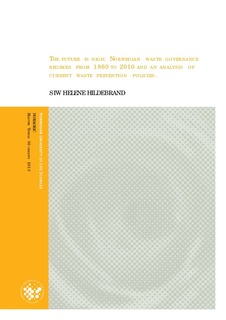| dc.description.abstract | This study is an analysis of current Waste Prevention (WP) policies in Norway, contextualised in a historical backdrop of development of Norwegian waste governance regimes from 1860 to 2010. By analysing how various regimes have responded to waste challenges by institutional change, we can better understand the current policy situation and why it is so difficult to avoid waste. We investigate the current WP policies and initiatives, and look at why they do not have much effect on the overall waste growth. The analysis of both the historical regimes and the current one, is done using a framework for resource regime analysis which based on Classical Institutional Theory. Data collection is mainly done from policy documents, statistics, reports, some second hand sources on waste history. For the final chapter, interviews with relevant professionals are also conducted. The findings suggest that waste governance has historically developed as institutional changes as reactions to waste challenges. Due to this reactive nature of waste governance, the proactive nature of WP is therefore not leading to any action. There are no political goals for WP, only that the waste growth shall be lower than the GDP growth. This is outside the reach of any waste or environmental authority to change. However, this study suggests a more pragmatic approach and a commodity-based approach to WP is presented. Every commodity has its own waste potential, and WP policy should be about either reducing that potential or removing it completely, depending on the type of commodity. When these potential waste categories are compared with agents and their motivation, we can begin to see the correlation between choice of instrument and where to aim it. This study suggests that it is easier to apply WP principles to agents or products that are under Product Control Act regulation, and that this principle should be taken into concern when articulating future WP policies. The biggest challenge for WP is the lack of crisis, however, with our unsustainable consumption, it is only a question of time before it hits us. | no_NO |
